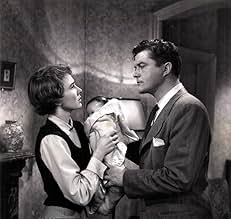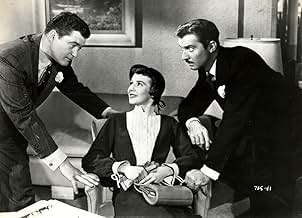Una trabajadora asciende en una agencia de publicidad tras impresionar a un cliente de alimentos para bebés con sus muñecas de apariencia real.Una trabajadora asciende en una agencia de publicidad tras impresionar a un cliente de alimentos para bebés con sus muñecas de apariencia real.Una trabajadora asciende en una agencia de publicidad tras impresionar a un cliente de alimentos para bebés con sus muñecas de apariencia real.
- Dirección
- Guionistas
- Elenco
- Peggy
- (as Sheila Stephens)
- Train Passenger
- (sin créditos)
- Danny
- (sin créditos)
- Subway Commuter
- (sin créditos)
- Club Patron
- (sin créditos)
- Traffic Cop
- (sin créditos)
- Passerby
- (sin créditos)
- Passerby
- (sin créditos)
Opiniones destacadas
Certainly, Drake and Gwenn don't lack for sparkle. The trouble is the humorous situations seldom get the comedic bounce they need. As a result, the set-ups tend to fade into the narrative itself. I suspect director Windust simply lacks the right touch for comedy, which I also suspect is harder to do than drama. Then too, the usually lively Dennis Morgan appears oddly distracted, while the usually villainous Zachary Scott shows he's not entirely out of place.
Anyway, the movie's a good glimpse into the coming consumer age through the medium of an advertising agency. And catch how sensitive the norms of the period are to unwed motherhood. In fact, take away the unwed part, and much of the story would collapse. From these standpoints, the movie's a good foreshadowing of the 1950's as a whole—though it's likely the charming Drake didn't fit the coming age of Marilyn's, Jayne's, and Mamie's. Too bad, because as the deserving working girl in this film she's darn near perfect.
Overall, the movie manages some clever set-ups, a few chuckles, but most of all, a good glimpse of its time period.
Like Will Success Spoil Rock Hunter? (1957) it is about the advertising industry. But, this one seems more natural--not as forced. Also, we get to see Dennis Morgan, Zachary Scott, and Edmund Gwenn in funny situations such as we have never seen them in before. Here, Dennis Morgan is more than just a singer in for light comedy (he actually gets mad and frustrated here). Zachary Scott proves he can be funny too, and Edmund Gwenn shows how angry and totally confused he can be in this zany situation.
The story: Sam Morley (Dennis Morgan) heads up an advertising firm, and Barry Holmes (Zachary Scott) is his right-hand man. Patsy Douglas (Betsy Drake) works at the firm as a lowly mimeograph operator, but is infatuated with her boss, Morley. One day, Morley's secretary quits her job to get married, and Patsy is chosen to temporarily take her place. She is a failure as a secretary and is soon to be replaced.
However, at the same time, she wins over the firm's chief advertiser, Cyrus Baxter (Edmund Gwenn), owner of Baxter Baby Food—the largest company to advertise with Morley's firm.
How does she win him over?
She does it as the mother with a baby named after Cyrus Baxter while the two happen to be riding in a subway together. However, the baby (covered by a blanket) is not real; it is a doll from the hallway display that Patsy had taken from the advertising agency in order to get a seat in the subway. After being flattered that Pasty would name a baby after him, the normally grouchy Baxter insists that she work on the Baxter account--or he would take his million-dollar account elsewhere. But, what should Morley and Holmes have the untalented Patsy do? Copywriting, i,e, making up advertising jingles for Baxter Baby Food.
The story is zany and fun. It also shows us how to break up a fit of anger: by just start reciting Longfellow's poem, The Song of Hiawatha. If you can say "On the shores of Gitche Gumee..." and still stay angry, you are hopeless.
Patsy (Betsy Drake) is a ditsy and somewhat annoying lady. She is terrible at her job and it isn't surprising when she's fired from the advertising agency where she works. However, what her bosses don't realize is that she has a man who is very smitten with her. No, he's not attracted to her specifically but he thinks she's a terrific mother and is raising a wonderful baby. There is a problem with this...she isn't a mother and doesn't have a baby. What actually happened is that in order to get a seat on the subway, she wrapped a doll up like a baby...knowing that men will give up their seats to a 'mother'!
So what about this man? Well, he's Cyrus Baxter (Edmund Gwenn)...the advertising agency's top client. And, he's taken with the lady because when they talk on the subway, he asks about her 'baby' and she tells him she named it 'Cyrus Baxter Douglas'. Why this name? Well, she panicked and chose the name of the guy so important to her company...not knowing the man on the train IS Cyrus Baxter! Now, he wants to be her benefactor and this nasty old man suddenly begins to behave like a nice old man!
As for her job, when the bosses realize that Baxter LIKED Ms. Douglas, they hire her back and give her a raise AND a promotion. What's next for these folks? See the film.
The film is filled with wonderful moments...particularly when grouchy old Mr. Baxter takes a paternalistic attitude towards her and the 'baby'. But again and again, the film starts touching you...and then manages instead to not quite seal the deal. The tender, sweet or funny moments often are punctuated with folks yelling at each other...which severely impacts on the overall story.
This is 1950, so women have been "liberated" and male chauvinism is a thing of the past. Where men formerly gave up their seats to women on buses and trollies, the liberated women now fend for seats with the men. Betsy Drake's Douglas is all for the progress that has been made, but she would have preferred that some of the old manners hadn't been thrown out with women's "liberation."
The scenes with Patsy's doll baby and a few others have some comedy. But there's nothing here to evince rollicking laughter. Edmund Gwenn is very good as the grumpy Cyrus Baxter. Some may think that Gwenn is out of his usual character (i.e., his Kris Kringle from "Miracle on 34th Street"), but Gwenn was an accomplished actor who played diverse roles - including some grouchy or distasteful characters.
The other leads, Zachary Scott as Barry Holmes and Dennis Morgan as Sam Morley, are okay up to a point. But Morley's falling for Patsy just isn't believable. There's nothing in the screenplay to even give a hint of romantic inclination on Morley's part - although there is on Patsy's part initially. All of his encounters have been with a fumbling, accident-prone Patsy. He has been upset with her and even though a plot twist leads to her keeping her job, there's nothing romantic until the very end when Morley just suddenly falls for Patsy. It actually came across as a dumb, poor ending as though the writers couldn't think of anything better.
And that gets to Betsy Drake. While she made a few comedies, she had a certain innocence yet intelligence about her persona. So, one tends to like the characters she plays. But she definitely is not a laugh-inducing comedienne. Nor does she have a personal that suggests or invites romance.
As I said, it's a stretch to give this six stars, but most people should enjoy the film and may find it somewhat amusing.
¿Sabías que…?
- TriviaThe stack of baby photos which they sort through includes one used in El canto de la victoria (1942) eight years earlier.
- ErroresAlmost an hour in, as Zachary Scott is convincing Betsy Drake to present Sam's campaign to Cyrus Baxter, he leads her out of the office door, saying, "Now remember, Patsy, the code of the firm..." As Sam's office door closes, at the top of the door can be seen the very bright studio lights that were used to light the scene before."
- Citas
Caravan Club Waiter: [at the Caravan Club Morley is at the table while Holmes dances with Patsy] Fresh drink, sir?
Sam Morley: Yes, a double. And, waiter...
[takes out some money]
Sam Morley: here's ten dollars for your trouble. Go to the dance floor and tell Mr. Holmes he's wanted on the phone.
Caravan Club Waiter: Sorry, sir. Mr. Holmes gave me twenty dollars *not* to call him to the phone. Anything else, sir?
Sam Morley: [puts money back] A sharp knife.
- ConexionesReferenced in Yo amo a Lucy: The Fashion Show (1955)
- Bandas sonorasPretty Baby
(uncredited)
Music by Egbert Van Alstyne and Tony Jackson
Lyrics by Gus Kahn
Played during the opening credits and occasionally in the score
Sung by Dennis Morgan
Selecciones populares
Detalles
- Tiempo de ejecución
- 1h 32min(92 min)
- Color
- Relación de aspecto
- 1.37 : 1




















